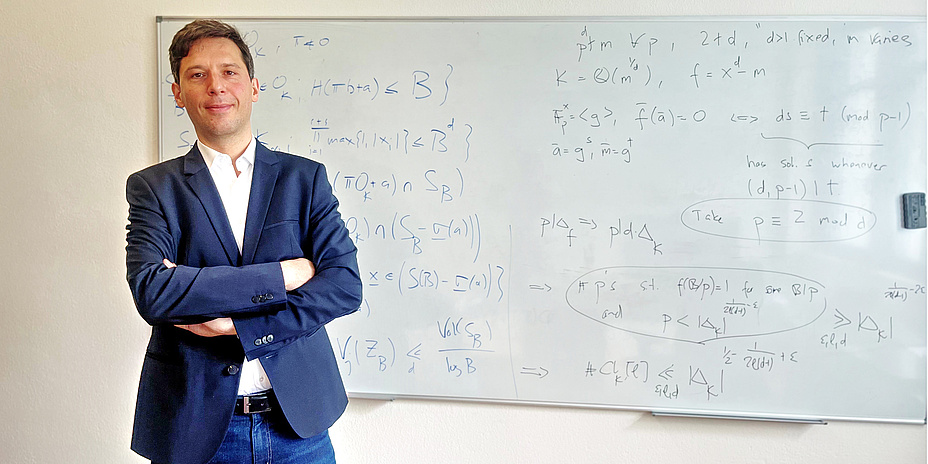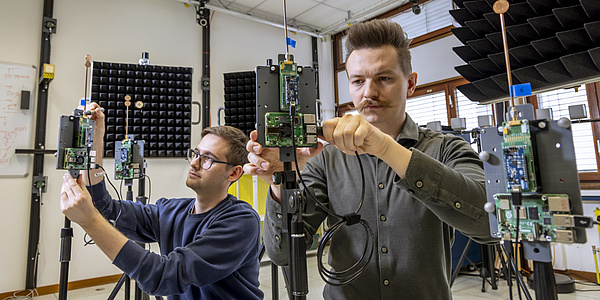Martin Lucien Widmer: I Simply Enjoy Mathematics

There are still boxes in the office, the desk is only sparsely filled – but the whiteboard hanging on the wall behind it is already covered to its silver edges with equations, formulae and letters. Mathematician Martin Widmer knows no rest when it comes to his speciality. “I simply enjoy mathematics,” he says. The 47-year-old has been Professor of Analysis and Number Theory at TU Graz since April. His field of work lies between arithmetic statistics, algebraic number theory and the geometry of numbers. Height functions are also a central topic of his research.
Did you ever come to TU Graz before your professorship?
Widmer: Yes. But more by chance. I was working as a postdoc at the University of Texas and was looking for other positions at short notice – mainly in Europe. Professor Tichy was the first person from whom I received a positive response. That’s how I came to Graz University of Technology (TU Graz) for the first time and brought a new field of research with me. Here I have been given the freedom to continue working on it.
Which one is that?
Widmer: I was already very interested in height functions back then. Height functions are tools to measure the arithmetic complexity of algebraically defined objects, e.g. algebraic numbers, and they now appear in many areas of number theory. Nevertheless, height functions are still somewhat mysterious. There are some fundamental questions that we are still unable to answer. The most famous example is probably Lehmer’s conjecture of 1933.
Height functions are still somewhat mysterious. (Martin Widmer)
I was also interested in questions from arithmetic statistics back then – height functions also play a role there. Arithmetic statistics is a relatively new branch of number theory and deals with the statistical distribution of arithmetic objects, e.g. class groups. The latter encode information that tells us, for example, whether the associated number range has a unique prime factorisation.
Is this also the area in which you will continue to work at TU Graz?
Widmer: What is certain is that I will continue to deal with l-torsion subgroups of the class groups. There is a central assumption in this area, with far-reaching consequences. However, it is currently out of reach. Even small advances are difficult to achieve and require new ideas, which are often also useful in other ways.
Arithmetic statistics is quite competitive and has been very popular for several years, perhaps also because Manjul Bhargava was awarded the Fields Medal in 2014 for results in this field. Bhargava has introduced many new ideas and methods.
Is the research community very supportive or competitive?
Widmer: I think it’s both. A few years ago, my colleague Christopher Frei and I published a paper on class groups that contained a new, powerful idea. The actual results have been significantly improved in the meantime, but our idea is reflected in the more recent work of our colleagues and I am very pleased about that. I see research more as a joint project. Everyone stands on the shoulders of others. On the other hand, there is a fast pace in this area at the moment. If you want to contribute something, you have to be very quick. This dynamic can be motivating.
I see research more as a joint project. Everyone stands on the shoulders of others. (Martin Widmer)
Does it do that for you?
Widmer: Yes of course. I really enjoy immersing myself in a topic and making it a little bit better. And in as short a time as possible. But I am also happy to be active in other areas that are not quite so competitive.
For relaxation?
Widmer: Yes (laughs). In fact, the frustration can sometimes be immense when many teams are working on the same problem. What’s more, things rarely go as planned in research anyway. I think it helps to work in several areas and to have a certain thematic breadth. In this way, you bring new approaches that others may not have. Real progress starts when you think outside the box.
Real progress starts when you think outside the box. (Martin Widmer)
So there are more areas in which you work?
Widmer: Yes, for example the geometry of numbers. In addition, there are often questions about the aforementioned height functions that also concern me.
Do you see links to other disciplines at TU Graz?
Widmer: Yes, for example with geometry. The theory of o-minimal structures deals with subsets of Euclidean space with particularly nice geometric properties. This theory has proven to be very useful in number theory. In any case, I’ve already lent my colleague Professor Kerber from the Institute of Geometry a book on o-minimal structures as a precaution (laughs).
Beyond that, it unfortunately becomes a bit too speculative. I work in pure mathematics and collaborations beyond the field are rather rare. I am not necessarily looking for an application of my results. It’s good when my work has a practical use, but that’s not what drives me. I simply enjoy maths. I just find a task that has a clear, unambiguous solution particularly appealing.
Mathematicians generally don’t like doing calculations, do they?
Widmer: I try to avoid calculations if possible. But I like numbers and number games. For example, I think the number 2025 is very nice, because 2025 is the square of the sum of 20 plus 25. And 45 is the sum of the first nine natural numbers. And the square of this, i.e. 2025, is therefore also the sum of the first nine cubes. Behind this there is also a beautiful geometric identity. For me, maths always has a playful element.
So it’s no coincidence that you came to TU Graz in 2025. We are absolutely looking forward to working together!
Kontakt
Martin WIDMER
Institute of Analysis and Number Theory
Kopernikusgasse 24
8010 Graz
Phone: +43 316 873 7629
martin.widmer@tugraz.at



